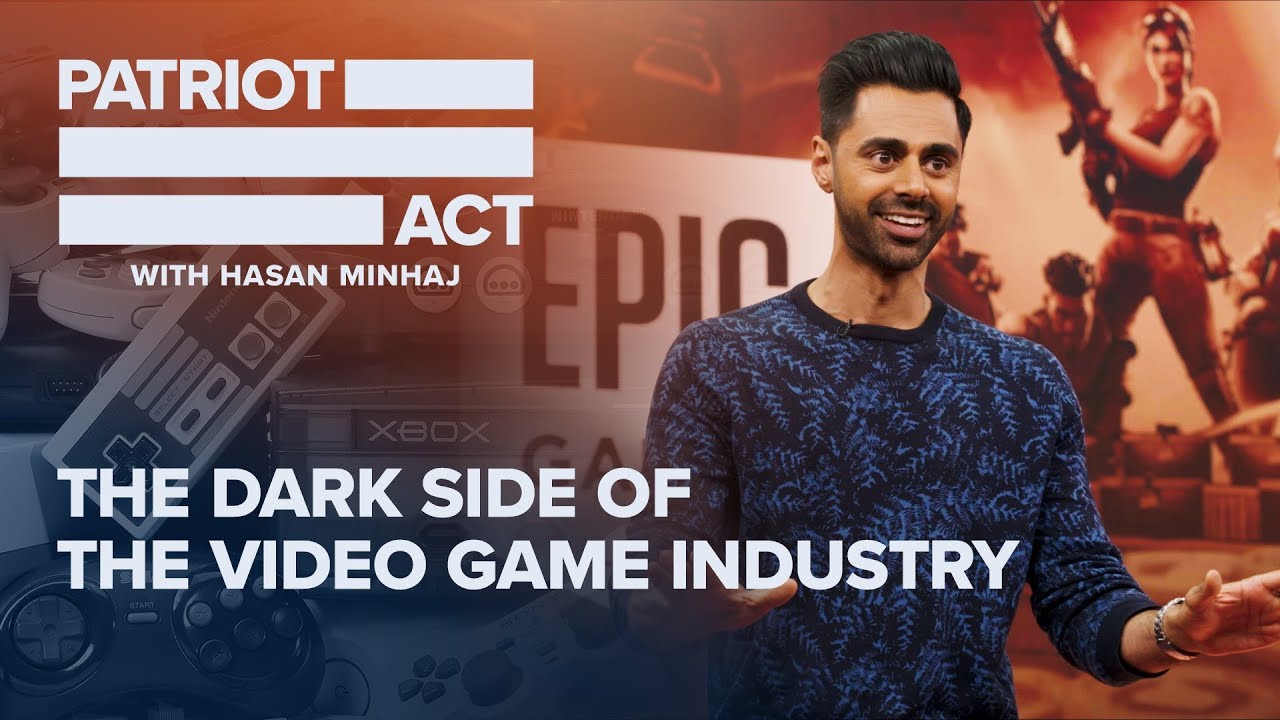The Dark Side of the Video Game Industry | Patriot Act with Hasan Minhaj | Netflix

On the latest episode of Patriot Act, Hasan takes a look at how the video game industry has grown into a $139 billion a year business and a cultural force.
While gaming is more prominent than ever, some of the most popular video games are made under unfavorable working conditions. Hasan examines the exploitative labor practices at game developers like Epic and Riot Games, and the ways in which workers are finally fighting back.
Why are game developers paid lower salaries compared to other industries with similar skill requirements, as revealed in Patriot Act?
The video game industry is an apparent source of entertainment to millions worldwide, with an estimated 2.7 billion gamers worldwide. However, the scenes behind the screens tend to be the darker side of this revolutionary industry. Hasan Minhaj, a well-known comedian, and social critic explores these scenes in his Netflix docuseries, Patriot Act, focusing on the exploitation, abuse, and the competitive nature of the industry.
One of the primary areas of concern lies in the working conditions of the game developers. The overtime subject among developers, popularly known as “crunch time,” has been a prevalent practice in the industry. Game development companies impose unrealistic deadlines that leave developers with indisputable ultimatums, work tirelessly, or lose the job. Most of the developers have to work programming strings of codes, animations, and other technicalities for up to 100 hours per week, which is detrimental to their mental and physical health. Keeping up with the demand is critical to game developers, and failure to meet a deadline can cost millions of dollars.
In addition to the punishing nature of video game development, Hasan Minhaj also delves into the pay received by developers in the industry. Game developers, who are the backbone of the industry, are often paid meager wages. With the increased demands of the job, one would assume that pay would mirror this but instead, developers earn an average of $50,000 yearly. Compare this with salaries paid to people in other industries with comparable skill requirements, such as software engineers, and it’s clear that developers are being undervalued. As a result, many developers opt to leave the industry to seek better pay despite investing so much into their career paths.
The competitive nature of the game development industry has put independent game developers on the back foot. Large companies such as Electronic Arts or Ubisoft dominate the scene, and their massive budget allows them to leverage their power over small companies. Video game developers face the economic reality of low investment capital and pricey advertising, making them vulnerable to takeover by larger companies regularly. Competition has become paramount in the industry, and small game developers are at a disadvantage. The big gaming companies take over and exploit their ideas and concepts, leaving independent developers with little compensation.
One of the most critical issues Minhaj presents in his documentary is the exploitation of youth in the game development process. Ethical standards regarding the young developers’ employment have been overlooked, with many working without pay. These youngsters dream of making it in the video game industry, but are often found as interns, unpaid and overworked. Many developers, including Ubisoft, employ unpaid interns, exploiting them for the fierce competition amongst companies to make the most extensive games to dominate or dethrone competition.
In conclusion, The Dark Side of the Video Game Industry, as portrayed in Patriot Act, is both excruciating and shocking. The competitive nature, long hours, forced overtime, low salaries, and unstable working conditions have created an environment in which developers are more vulnerable than sustained. Critical issues like these must be addressed to make a game development home-field, which prioritizes the welfare of developers in terms of payment, working conditions, and fair play, especially those junior game developers aspiring to make it in the industry. After all, the technology is growing and the creative minds behind each revolutionary video game need a conducive environment where their welfare is prioritized over mere gaming entertainment.
Warning: Trying to access array offset on value of type null in /srv/users/infosearched-network/apps/infosearched-network/public/wp-content/themes/rehub-theme/functions/review_functions.php on line 499
Warning: Trying to access array offset on value of type null in /srv/users/infosearched-network/apps/infosearched-network/public/wp-content/themes/rehub-theme/functions/review_functions.php on line 503









10 Most Shocking Beauty Treatments
10 Unusual Women’s Beauty Standards In BRAZIL
The REAL Story Behind 10 Popular Internet Memes
10 Famous Couples With The BIGGEST Age Gap
10 Celebs Who Have Been To Jail